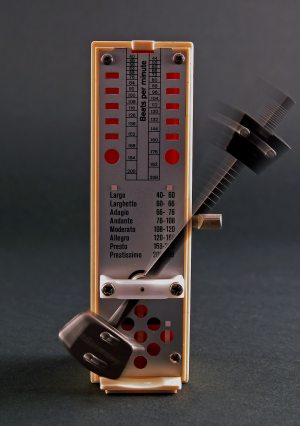When we analyze the music in order to find interesting solutions, we are bound to pay attention to its most important aspect – the rhythm. Rhythm is the basis for almost all types of music, especially for the popular genres. Most of the modern hits contain syncope, that makes the rhythm more catchy. Less impact on the listener has melody and harmony. Is it possible to find an objective reason for this phenomenon?
 The first and probably the most important thing is that the rhythm is not a unique element of the music. It is part of other types of arts. But most importantly, that nature and the human body also contains rhythms. Rhythm is the link allowing the composer to manage emotions and feelings of the listener at the physiological level. Slowing down the tempo can lead the listener into a state of calm, peace or deep thought. Accelerating the tempo, in turn, holds to the excitement or motivation.
The first and probably the most important thing is that the rhythm is not a unique element of the music. It is part of other types of arts. But most importantly, that nature and the human body also contains rhythms. Rhythm is the link allowing the composer to manage emotions and feelings of the listener at the physiological level. Slowing down the tempo can lead the listener into a state of calm, peace or deep thought. Accelerating the tempo, in turn, holds to the excitement or motivation.
In combination with the harmony and melody rhythm gives the opportunity to get almost any result. By using the rhythm you can grab so much attention that the other elements of the musical texture simply cease to have value. Also by rhythm, we pass some universal messages that may have very deep roots.
An interesting fact is that at in ancient times the rhythmic systems were based on triples. Subsequently, binary superseded tripling and then both types of division become equal. Systems based on 5,7,9 etc initially seen as exotic, but gradually they became the standard way to diversify rhythmic figures. To date, these rhythms have already become important, as symbols of the musical language.
The study of rhythm gives a lot of interesting ideas. It is proved that there is a connection between musical rhythms and biorhythms of the human brain. Even more, human rhythms can coordinate with the musical rhythms. The stronger this phenomenon is expressed in humans, the more prone the individual to a deep and subtle musical experience. Also, these people have a greater predisposition to the music as a whole.
Each example of music, whether classical suite or dance track has its own musical rhythm. Unlike melody, most people perceive the rhythm at the subconscious level. Scientists believe that rhythm has a decisive influence on the physiological and emotional state of an individual in the process of musical perception. There is every reason to believe that in the process of perception of musical rhythm brain biorhythms tune to its frequency. The most powerful experiences can occur at the time of resonance – the coincidence of the dominant in a human biorhythm frequency with musical and rhythmic pulsations.
I have been reviewin online more than seven hours today for similar subject, yet I never found any interesting article like yours. It’s pretty worth enough for me. Personally, if all webmasters and bloggers made good content as you did, the internet will be a lot more useful than ever before.